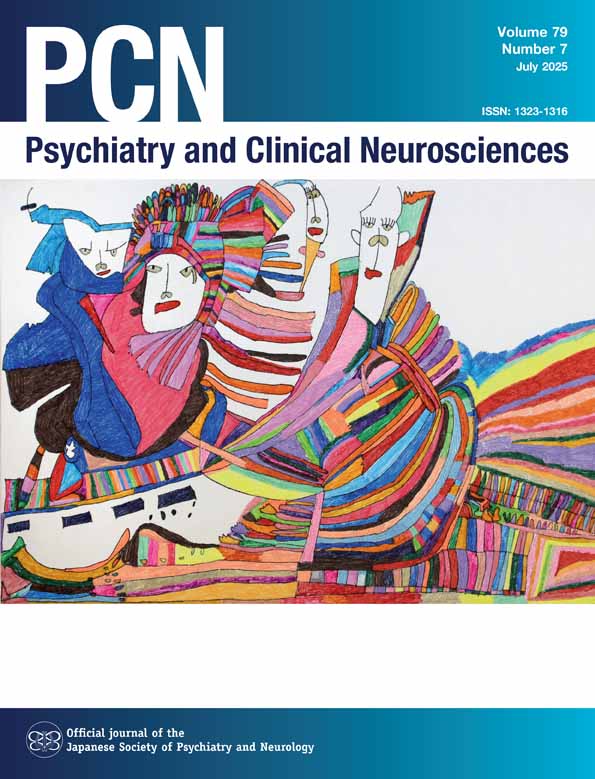Usefulness of Antiparkinsonian Drugs during Neuroleptic Treatment and the Effect of Clonazepam on Akathisia and Parkinsonism Occurred after Antiparkinsonian Drug Withdrawal: A Double-Blind Study
Corresponding Author
Jun Horiguchi M.D, Ph.D
Department of Neuropsychiatry, Ehime University School of Medicine, Ehime
Department of Neuropsychiatry, Ehime University School of Medicine, Shitsukawa, Shigenobu-cho, Onsen-gun, Ehime 791–02, Japan.Search for more papers by this authorOhichi Nishimatsu M.D
Department of Neuropsychiatry, Ehime University School of Medicine, Ehime
Search for more papers by this authorCorresponding Author
Jun Horiguchi M.D, Ph.D
Department of Neuropsychiatry, Ehime University School of Medicine, Ehime
Department of Neuropsychiatry, Ehime University School of Medicine, Shitsukawa, Shigenobu-cho, Onsen-gun, Ehime 791–02, Japan.Search for more papers by this authorOhichi Nishimatsu M.D
Department of Neuropsychiatry, Ehime University School of Medicine, Ehime
Search for more papers by this authorAbstract
Abstract: Antiparkinsonian drugs used for 117: chronic schizophrenic patients receiving long-term neuroleptic treatment were withdrawn. Seventy-eight (66.7%) of the 117: patients were without akathisia and/or parkinsonism at least for 6: weeks after the antiparkinsodan drug withdrawal. A double-blind study of clonazepam was carried out for 22: patients and clonazepam was effective on 8: patients (100%) with akathisia and on 3: patients (75%) with parkinsonism. The authors conclude that these data support the need for discontinuous use of antiparkinsonian medication during the long-term neuroleptic therapy of chronic schzophrenic patients and the effectiveness of clonazepam in managing antiparkinsonian drug withdrawal-induced akathisia and parkinsonism.
References
- 1 Adler, L., Anguist, G. and Peselow, E.: Clonidine in neuroleptic-induced akathisia. Am J Psychiatry 144: 235–236, 1987.
- 2 Aquilonius, S.M., Dolby, J. and Anggard, E.: Treatment of drug induced parkinsonism. Lakartidningen 73: 511–514, 1976.
- 3 Arendt, R., Greenblatt, D. and Liebisch, D.C.: Determinants of benzodiazepine brain uptake: Lipophilicity versus binding affinity. Psychopharmacology 93: 72–76, 1987.
- 4 Bucci, L., Fuchs, M. and Simeon, J.: Depot fluphenazine in the treatment of psychosis in a community mental health clinic. Dis Nerv Syst 31: 28–31, 1970.
- 5 Chien, C.P., DiMascio, A. and Cole, J.O.: Antiparkinsonian agents and depot phenothiazines. Am J Psychiatry 131: 86–91, 1974.
- 6 Chouinard, G.: CLonazepam in acute and maintenance treatment of bipolar affective disorder. J Clin Psychiatry 48: 29–37, 1987.
- 7 Crane, G.E.: A review of clinical literature on haloperidol. Int J Neuropsychiatry 3: (Suppl): 110–123, 1967.
- 8 DiMascio, A. and Demirgian, E.: Anti-parkinson drug overuse. Psychosomatics 11: 596–601, 1970.
- 9 DiMascio, A.: Toward a more rationale use of antiparkinson drugs in psychiatry. Drug Therapy 1: 23–29, 1971.
- 10 Dolezalova, B. and Vacec, J.: Anticholinergic antiparkinsonic drugs in contemporary psychiatry. Cesk Psychiatr 71: 398–403, 1975.
- 11 Fann, W.E., Lake, C.R. and Richman, B.W.: Drug induced parkinsonism. A re-evaluation. Dis Nerv Syst 36: 91–93, 1975.
- 12 Fennig, S., Levine, Y. and Naisberg, S.: The effect of trihexyphenidyl (Artane) on memory in schizophrenic patients. Prog Neuro-psychopharmacol Biol Psychiat 11: 71–78, 1986.
- 13 Fisch, R.Z.: Trihexyphenidyl abuse: therapeutic implications for negative symptoms of schizophrenia Acta Psychiatr Scand 75: 91–94, 1987.
- 14 Goldstein, B.J., Jordan, J.A. and Coleman, B.: Prophylactic treatment of phenothiazine-induced extrapyramidal effects. J Fla Med ASSOC 51: 775–778, 1964.
- 15 Goodman, G.A., Goodman, L. and Rall, T.: Goodman and Gilman's, the pharmacological basis of therapeutics. Macmillan Co., 1985.
- 16 Horiguchi, J.: Two cases of restless legs syndrome. Seishin Igaku 28: 835–837, 1986 (in Japanese).
- 17 Horiguchi, J., Nishimatsu, O. and Inami, Y.: Successful treatment with clonazepam for neuroleptic-induced akathisia. Acta Psychiatr Scand 80: 106–107, 1989.
- 18 Jellinek, T., Gardos, G. and Cole, J.O.: Adverse effects of antiparkinson drug withdrawal. Am J Psychiatry 138: 1567–1571, 1981.
- 19 Johnstone, E.C.: The demential of dementia praecox. Acta Psychiatr Scand 57: 305–324, 1978.
- 20 Johnstone, E.C., Crow, T.J. and Ferrier, I.N.: Adverse effects of anticholinergic medication on positive schizophrenic symptoms. Psychol Med 13: 513–527, 1983.
- 21
Klett, C.J. and
Caffey, E. Jr.: Evaluating the long-term need for antiparkinson drugs by chronic schizophrenics.
Arch Gen Psychiatry
26: 375–379, 1972.
10.1001/archpsyc.1972.01750220084016 Google Scholar
- 22 Korczyn, A.D. and Goldberg, G.J.: Extra-pyramidal effects of neuroleptics. J Neurol Neurosurg Psychiatry 39: 866–869, 1976.
- 23 Kutcher, S., Williamson, P. and McKenzie, S.: Successful clonazepam treatment of neuroleptic-induced akathisia in older adolescents and young adults: A double-blind, placebo-controlled study. J Clin Psychopharmacol 9: 403–406, 1989.
- 24 LaPolla, A. and Nash, L.R.: Treatment of phenothiazine-induced parkinsonism with biperiden. Curr Ther Res 7: 536–541, 1961.
- 25 Lipinski, J. F. Zubenko, G. S. and Cohen, B.M.: Propranolol in the treatment of neuroleptic-induced akathisia. Lancet i: 685–686. 1983.
- 26 Lipinski, J.F., Zubenko, G.S. and Cohen, B.M.: Proporanolo in the treatment of neuroleptic-induce akathisia. Am J Psychiatry 141: 412–415, 1984.
- 27 Manos, N., Gkiouzepas, J. and Logothetis, J.: The need for continuous use of anti-parkinsonian medication with chronic schizophrenic patients receiving long-term neu-roleptic therapy. Am J Psychiatry 138: 184–188, 1981.
- 28 McClelland, H.A., Blessed, G. and Bhate, S.: The abrupt withdrawal of antiparkinson drugs in schizophrenic patients. Br J Psychiatry 124: 151–159, 1974.
- 29 Mizuno, Y.: Treatment of Parkinson's disease with L-DOPA plus benserazide (Ro-4602). A double-blind cross-over study. Adv Neurol Sci 21: 807–834, 1977.
- 30 Montagna, O., de Bianchi, L.S. and Zuconni, M.: Clonazepam and vibration in restless legs syndrome. Acta Neurol Scand 69: 428–430, 1984.
- 31
Singh, M.M.,
Kay, S.R. and
Opler, L.A.: Anticholinergic-neuroleptic antagonism in terms of positive and negative symptoms of schizophrenia: implications for psychobiolog-ical subtyping.
Psychol Med
17: 38–48, 1987.
10.1017/S0033291700012964 Google Scholar
- 32 St. Jean, A., Donald, M. W. and Ban T.A.: Uses and abuses of antiparkinsonian medication. Am J Psychiatry 120: 801–803, 1964.
- 33 Swett, C.J., Cole, J.O. and Shapiro, S.: Extra-pyramidal side effects in chlorpromazine recipients. Arch Gen Psychiatry 34: 942–943, 1977.
- 34 Yagi, K.: Symptomatology of drug-induced akathisia—With special reference to the so-called psychoanaleptic effect of antipsychotic drugs (Neuroleptics). Psychiat Neurol Jpn 76: 757–779, 1974.
- 35 Zubenko, G.S., Lipinski, G.S. and Cohen, B.M.: Comparison of metoprolol and pro-poranolol in the treatment of akathisia. Psychiatry Res 11: 143–148, 1984.




